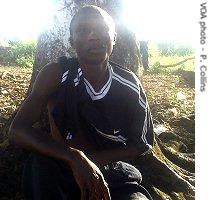2007年VOA标准英语-Liberia's TB Victims, Doctors Cry Out For Help,(在线收听)
Dakar
09 May 2007
Victims of tuberculosis in Liberia, as well as their doctors, are crying out for more help from their government and the international community. Funds Liberia was receiving from the Geneva-based Global Fund to fight tuberculosis and malaria have not been renewed. VOA's Nico Colombant has more from Dakar, with reporting by Prince Collins, at the tuberculosis treatment center in Monrovia.
Dozens of patients mill about inside Monrovia's National tuberculosis annex building, fighting off the curable but deadly and contagious respiratory illness, awaiting food and medicine.
 |
| Patient Morris Fofana needs medicine |
Doctors like Samuel Toe, are trying hard, and say they are doing what they can with what they have to help their patients.
"As you know, a lot of people in Liberia have come down with the disease," he said. "Access for treatment, for them, still remains a risk because of the lack of funding, so it really poses a serious problem to treating TB patients in Liberia."
Estimates are that about 17,000 Liberians have what is known as "TB", but only about 4,500 are receiving treatment.
The Global Fund was helping Liberia with its control program, but a two-year funding cycle ended earlier this year.
Doctor Toe says he sees more and more patients trying to get help.
"Almost every day, there is a new case from the community. So indeed if funding is lacking, then it will indeed serve as a setback to fighting TB in Liberia," he said.
The program's manager, Lawuo Gwesa, says many times family members abandon their sick relatives here, and do not help either. She says she sometimes uses her own money.
"Everybody needs love," she said. "When somebody is sick, do not desert them. It could be you. Most of them here, most of them, I take my own money and buy drugs for them because people do not come and visit them. They feel abandoned."
She says her program is running out of money to buy gas for motorcycles used to deliver medicine to other patients throughout Liberia.
Gas is also needed for laboratory generators and safeguarding medicine.
Gwesa says tuberculosis is a disease of poverty.
"Because of the war we fought, we have been in poor living conditions," she explained. "People have been living in small places. It is an airborne disease, and because of all this we have an increase. And also the HIV, we have more infected patients here who have the HIV and they have the TB, so because of the pandemic of HIV, TB cases are also increasing, so it is really due to poverty and poor living conditions of the people."
 |
| Funds are needed for Liberia's TB program |
An official at the Global Fund, Mark Willis, explained from Geneva, difficulties in working with previous governments created the gap in funding for malaria and tuberculosis.
"The original grants for both tuberculosis and malaria were written during a period of instability. So at the time, the grants were only for two years, whereas a normal funding cycle would be five years," said Willis. "In the meantime, the government of Liberia submitted different applications that were not accepted because of their quality and again it was during a time of previous governmental arrangements and perhaps that contributed to the quality of the reports."
Willis says he has been encouraged by the work of the new Health Ministry under President Ellen Johnson-Sirleaf.
The United Nations Development Program in Liberia consults the government on how to write the reports, and says government officials recently received training on writing better reports.
The new reports are due shortly, and new funding could begin before the end of the year. Once reports are accepted, however, getting money is not automatic.
Willis says while there has been interest from donors to help Liberia combat malaria, there does not seem to be much interest so far concerning tuberculosis.
In the past five years, the Global Fund's Web site says it has committed more than $7 billion spread over 136 countries to support interventions against AIDS, tuberculosis and malaria.